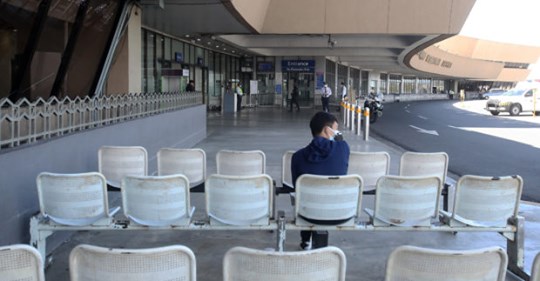
Philippine Airlines and its customers are bracing for dramatic changes in a post-lockdown era as the turbulent coronavirus (COVID-19) crisis unfolds.
From the ejection of the dreaded middle seat inside the passenger cabin to a potential-jump in ticket prices, the industry is preparing to restart operations in an environment that will bear little resemblance to their business before the pandemic.
At the forefront is the Air Carriers Association of the Philippines (Acap), comprised of the country’s three largest players. These are Philippine Airlines, Cebu Pacific Air and Air Asia Philippines, whose regular operations have been shuttered for over a month due to strict quarantine measures that are targeted for lifting on May 15.
Roberto Lim, Acap vice chair, told the Inquirer they are currently studying the best way to apply social distancing—a measure that keeps people physically apart to lower the risk of spreading the virus.
That can be difficult inside an aircraft cabin, especially for budget carriers that configure seats more closely together.
Lim said airlines could implement social distancing and still make money at 70-percent capacity.
That would remove 30 percent of the seats they can sell. Considering the configuration of most short and medium-range planes, this will leave the middle seat between the aisle and window seats empty.
“There will be a new normal once we resume flights,” Charo Logarta Lagamon, Cebu Pacific director for communications, said in an interview over the weekend. She added “middle seats will likely be left vacant whenever possible” and wearing face masks will be mandatory.
That will be easier to implement in the near-term if the fear of flying keeps demand depressed.
As the market recovers, while the threat of COVID-19 hangs, social distancing measures inside the cabin will force ticket prices higher, otherwise, airlines risk losing “enormous amounts of money,” International Air Transport Association CEO Alexandre de Juniac warned last April 21.
Jonathan Ravelas, chief strategist at BDO Unibank Inc., said airline ticket prices could increase anywhere from 30-50 percent during this period.
Ravelas said recovery would be slow but airlines should learn to adapt—as they did after the 9/11 terrorist attack and the 2003 SARS outbreak.“It’s innovate or evaporate,” he said, noting that airlines can charter more flights or increase their cargo business.